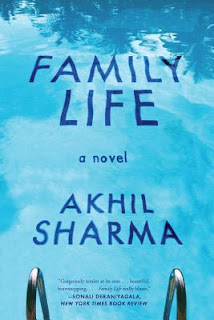Family Life by Akhil Sharma
Somewhere in the middle of Akhil Sharma’s stellar novel, Family Life, the narrator, Ajay Mishra, whose childhood is what the novel is about, starts a literary journey. He reads a biography of Ernest Hemingway before reading any works by him. In ninth grade at that point, he fantasizes about becoming a writer, and goes on to read critical essays on Hemingway. An essay tells him that “…Hemingway got away with writing plainly because he wrote about exotic things.” Thereafter, Ajay reads Hemingway’s novels and stories, developing his own understanding. After some months, he decides to write a story himself. His mind is clear: “…I knew that I should just push all the exotic things to the side as if they didn’t matter, that this was how one used exoticism—by not bothering to explain.”
In Family Life, an Indian family of four—a married couple and their two sons, Ajay and Birju—migrate to America. Months after settling in, Birju, the elder son, has a swimming pool accident and suffers brain damage. Ajay is ten years old then. The parents dedicate themselves to caring for Birju, and Ajay, the child, is thus destined to grow up with a half-dead brother, a mother who nearly abandons him emotionally, and a father who takes to alcoholism.
Great exotification was possible here. Family Life could have labored on how peculiar this family’s coping mechanisms were due to the fact that they were Indians, Indians in America. It could have fallen into the trap of explaining these peculiarities as derivatives of the immigration experience, or worse, tried to make a comment about exile. It could have been an immigration-novel-with-great-tragedy-at-its-heart. Its greatest strength, instead, is that while it uses these notions—saffron-clad miracle workers do step in, there is racism in school—it never is explicitly about them. This result is achieved through the same cunning that Ajay discovers in Hemingway. Sharma does describe the exotic and the peculiar, but he does so in the simplest language, always seeming to be brushing it aside, never explaining ‘Indianness’ or using it to explain anything. On rare occasions, this assumption of a priori knowledge has a strange effect. Ajay once calls the paralyzed Birju “Brother-Life,” just to sound ridiculous to himself. The joke is lost on readers who cannot sense the original phrase in Hindi “Bhai-jaan.” For the English-only reader, Sharma is happy to use the intrigue of a strange appellation and isn’t bothered to explain further.
Only once is Hindi used. When visited by people, Ajay’s mother says of her husband: “Unhe baut thakan hai.” Sharma explains: “The phrase did not say that he was feeling tired but that he possesses tiredness, and with its indirection highlighted that something was being avoided and so asked the listener not to inquire any further.” The impact is telling.



Comments
Post a Comment